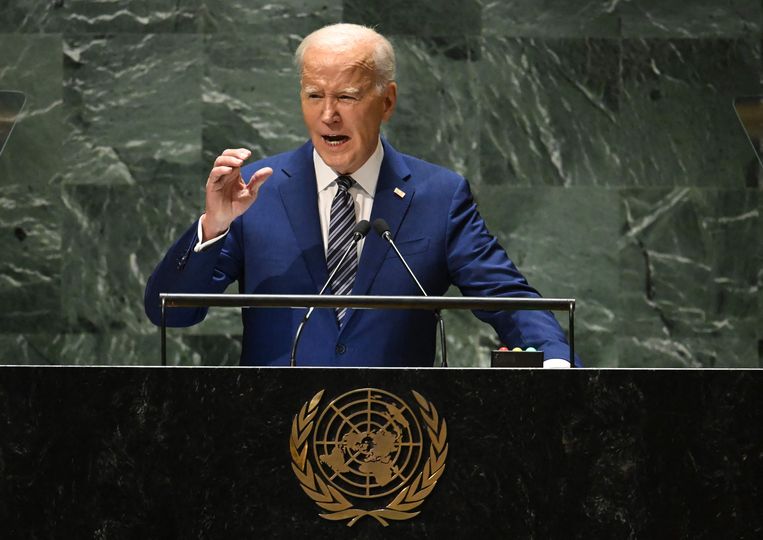The two first speakers at the annual United Nations General Assembly in New York seemed to use more or less the same political clichés. Brazilian President Luiz Inacio Lula da Silva and U.S. President Joe Biden spoke on Tuesday about lifting people out of poverty, fighting climate change and resolving conflicts peacefully.
But those who listened more carefully heard differences. While Biden emphasized how many people have been lifted out of extreme poverty in recent years, Lula drew attention to the millions of people who “go to bed tonight not knowing if they’ll have food tomorrow.” While Biden insisted his country was making international institutions fair, Lula castigated the Western-dominated IMF and World Bank. “If institutions reproduce inequality, they are part of the problem, not part of the solution.”
Ukraine is low on the agenda this year
Lula mentioned the war in Ukraine, but somewhere at the end of the list of conflicts everyone should be paying attention: the Palestinians, Haiti, Yemen and Burkina Faso were prioritized on that list. He called for talks with the Russians. Biden rhetorically wondered if the world allowed compromises on the basic building blocks of international order, territorial integrity, “could anyone in this room feel any more secure.”
The war in Ukraine is low on the agenda of world leaders gathered this year. “If we had it, we would spend more time in Ukraine,” he noted The New York Times From Olof Skoog, Ambassador of the European Union to the UN. But countries from the Global South prefer to talk mainly about development.
The Security Council was blocked by Russia
Although low on the agenda, the UN It is that war that has recently led many analysts to conclude that it is losing its relevance. Russia is one of the five permanent members of the UN with veto power.
The general assembly also seems to share in the tragedy. Because when Biden and Lula gave their speeches, important world leaders were missing from the audience. Russian President Vladimir Putin and Chinese President Xi Jinping will not attend this year’s summit due to tensions between their countries and the United States. But the fact that British Prime Minister Rishi Sunak and French President Emmanuel Macron had to do something even more important, like Indian Prime Minister Narendra Modi, is seen as a sign of the future in the world of diplomacy. Do those leaders no longer have contracts in the corridors of New York?
The Marketplace of International Politics
The truth is that other informal international forums have emerged in recent years, often a bit smaller, but a little more effective, such as the G20, G7, BRICS and a revived NATO.
Yet not all of them can take over the role of the UN General Assembly for now, says Martin Binder, a political scientist at the Forward College in Berlin who studies the functioning of international organizations. He likens it to the marketplace of international politics, where each country has one vote and it becomes clear once a year what the rest of the world thinks about some political development. Despite the criticism over the years that it was just talk, nothing was resolved, that action has not diminished.
Binder also agrees: the UN is a multi-faceted organization with many parts. UN The Security Council, yes, it’s wobbly now. On the other hand, says Binder, it should be staggered, too. “That’s the right idea, it’s in the UN Charter. Anything sensitive to big powers can be vetoed. That’s the condition that major countries join the UN, otherwise it wouldn’t exist.
Diplomatic channels
In addition, the Security Council was not silent, for example, at the height of the Cold War, the United States and the Soviet Union no longer spoke to each other. Binder has studied how much informal consultation is taking place, and it appears that it is not actually decreasing. The Security Council is the ideal forum where diplomats keep channels open to each other and where less contentious matters such as the authorization of some UN peacekeeping forces proceed.
UN Binder points to another pressing development: the contrast between the wealthy West, led by the United States, and the Global South, of which Brazil is one of the representatives. He examines the mood at the UN and finds that the two groups have increasingly turned against each other in recent years.
The complaint from the South that international institutions are unfair has been around for decades, but the difference now is: they are economically more powerful and therefore harder to ignore. Can the UN accommodate the growing power of the South in the coming years by reforming the Security Council? “That’s the key question.”
read more:
Comment: BRICS does not provide a new world order, but it is needed
The expansion of the BRICS partnership with six new members has been referred to here and there as ‘historic’, but its precise historical significance is unclear. The global enthusiasm for membership in this club, which defines itself primarily against the West, is clearly a wake-up call to policymakers in the US and Europe.

“Award-winning beer geek. Extreme coffeeaholic. Introvert. Avid travel specialist. Hipster-friendly communicator.”








